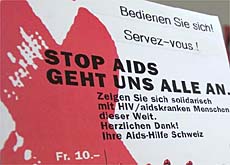Rise in HIV blamed on complacency

Switzerland is heading for a 20 per cent rise this year in the number of people testing positive for HIV, the virus which causes Aids.
At the end of October, the number of new cases of HIV infection – about 630 – was the same as for the whole of last year.
“It’s a disturbing trend and shows that the work of prevention has not yet been accomplished,” Christoph Schlatter, spokesman for the Swiss Aids Federation, told swissinfo.
“After 15 years of the Stop Aids campaign , people are a bit weary. People know that they have to use a condom but fatigue sets in.”
On Monday, the Federal Health Office is to publish statistics for the first ten months of this year.
The composition of the high-risk groups has changed since 1990. The main rise is now among the heterosexual population. The level of infections among homosexuals remains high but steady while the percentage of injecting drug users has declined.
“The increase among women is very high and that is a great cause of concern for us,” Ruth Rutman, director of the Swiss Aids Federation, told swissinfo.
Immigrants
One trend, which has been observed for several years, is the rise in cases among immigrants from countries where the heterosexual transmission of HIV predominates.
For Switzerland this is mainly people from the sub-Saharan region.
“They account for a very great proportion of the heterosexual cases that we have in Switzerland,” said Martin Gebhardt, who is responsible for HIV/Aids epidemiological analysis at the Federal Health Office.
“This is a trend we have observed for three or four years and it has continued to be a significant trend this year also.”
Both the government and the Swiss Aids Federation are concerned with the rise. It follows a decreasing trend for more than eight years until the year 2000.
“I think it is quite a disturbing sign,” Gebhardt told swissinfo. “If the decreasing trend [indicated] successful prevention in the general population, we can conclude that preventive efforts are not as effective as in the past.”
Complacent
Effective therapies, which have been around since the middle of the 1990s, are also believed to have led to more complacent attitudes.
“It’s partly to do with the drugs which are available today,” said Schlatter. “Some people have the false impression that you can cure the disease and that it is no longer a problem.”
Some 20,000 people are living with HIV in Switzerland.
Worldwide some 40 million people were living with HIV at the end of 2001. A further five million new infections are predicted by the end of 2002.
In 2001, three million people worldwide died of Aids. The theme of this year’s World Aids Day on December 1 is discrimination.
Portugal and Spain have the highest rates of incidence of HIV in Europe. Switzerland has comparable levels per head of population with France and Italy while Germany and the UK have lower levels.
The reasons are not always clear and may be partly due to different reporting systems.
When Switzerland saw a decrease in the number of cases throughout much of the 1990s, levels in many other countries remained steady though they rose in Portugal and exploded in Russia and the Baltic countries.
swissinfo, Vincent Landon
Switzerland is heading for a 20 per cent rise in HIV infections.
There were about 630 new cases of HIV infections by the end of October.
In 2001, three million people worldwide died of Aids.
Portugal and Spain have the highest rates of incidence of HIV in Europe.

In compliance with the JTI standards
More: SWI swissinfo.ch certified by the Journalism Trust Initiative








You can find an overview of ongoing debates with our journalists here . Please join us!
If you want to start a conversation about a topic raised in this article or want to report factual errors, email us at english@swissinfo.ch.